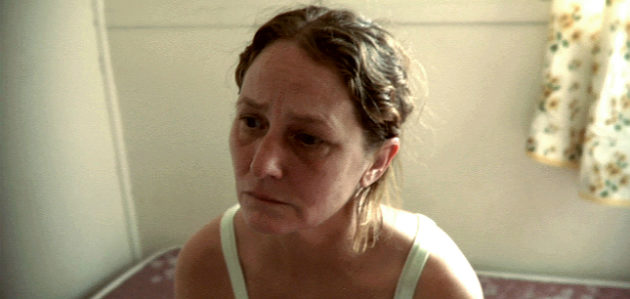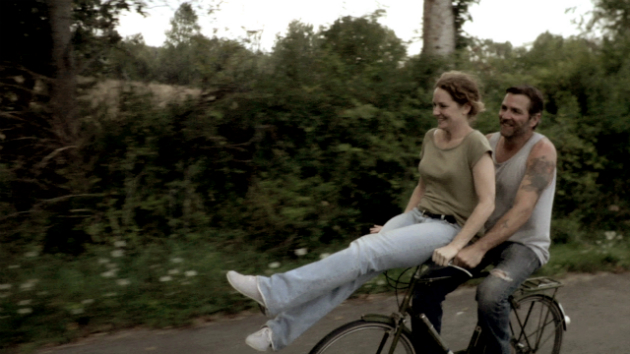SXSW: Melissa Leo Considers Post-Oscar Offers, Animal Ethics, and Her Minimalist Tour de Force Francine

Despite nabbing an Academy Award last year with her self-financed and controversial “Consider” campaign, Melissa Leo says that neither life, nor the frequency of juicy Hollywood offers coming her way, is much different now that she's an Oscar-winner. “The projects you think have been offered to me have not, I guarantee you,” she told Movieline this week at SXSW in Austin, where she and directors Melanie Shatzky and Brian M. Cassidy screened their minimalist character study Francine to critical applause. Still, Leo perseveres. And as the intimate acting showcase demonstrates, there’s plenty of reward to be had in smaller and more daring projects.
Francine follows the quiet, often disorienting moments in the experience of a woman recently released from incarceration (Leo) who is now slowly and cautiously adjusting to life on the outside. Taking on a number of jobs and tentative friendships, Francine finds herself increasingly comforted by stray animals she adopts, only further alienating herself from the people around her. Filming in New York’s Hudson Valley region, co-directors Shatzky and Cassidy tapped their photography and documentary film backgrounds to capture Francine’s attempts and failures at human interaction with a sensitive observational style that allows Leo the space to fully, and courageously, inhabit the character.
Prior to Francine’s SXSW premiere (which garnered high praise for Leo’s performance and the directors’ minimalist use of visual and aural elements), Leo spoke with Movieline about why she sought and lobbied for the lead in Francine, how things haven’t changed all that much since winning her Oscar, the emotional scene in which a dog appears to be euthanized onscreen, and why it was important to show Hollywood that she could “show up.”
How did you come to meet these folks and hear about their idea?
It was the summer before last sometime in the springtime, and the Hudson Valley film commissioner is a good friend of mine – he and his wife run the Woodstock Film Festival – and I get little blurbs from them online about what’s going on in the Hudson Valley. It was a casting call, but not for Francine – for the various and sundry characters she meets along the way, and a lead lady was required for this film. The name was Francine, after all! They were going to do something very interesting and tell a story largely through the pictures and not so much dialogue; that sounded like a really interesting notion, so I inserted myself through Laurent [Rejto] and said if they’d be interested in considering me for Francine I would love to talk to them about it.
And this was before you’d even seen a script?
From a paragraph, really, which I think was based on their own words. Just a little paragraph of what it was.
You sought this out from a single paragraph description, which makes me wonder: What sort of projects do you look for, and are you always searching?
Constantly looking is a very good way to put it, but I don’t know that I’m looking for one thing or another in particular. Something specific, but it could be a lot of things that are specific. And this project sounded A) very specific, B) a leading role, and this notion of taking film – young, young, film – into yet another realm – really taking it back to its basics, of the images. The sound in Francine is a very important element in the film, both the music that’s laid in and the sound – just like in The Artist! That’s not a silent movie; you don’t hear the actors’ dialogue but again in that film the sound is such an important aspect of the film. That all really intrigued me, but probably first and foremost the thing that caught my attention was the chance to do a lead.

But you’re Melissa Leo! Are lead roles still hard to come by?
Who’s that? [Laughs] I say that to you because that’s what most people even today still say. Cab drivers… and then there’s this embarrassing moment when they say, ‘Oh, I’m so sorry, I didn’t realize!’ It’s really ok! Maybe I should wear a stamp on my forehead. But more seriously, the life of an actor is not what one imagines, and I find too that the life of an Oscar-winner is not what one imagines. For an actor, for an Oscar-winner, life is no different than for all the rest of us. We must try each day to be our best selves and make our best choices. Maybe we have a finer array of choices put in front of us, but the process is no less different. My experience, 365+ days later? The projects you think have been offered to me have not, I guarantee you. It will happen in time, if I persevere. But if I expect something to return because I took a beautiful golden statue and a lot of prestige home, I’m going to miss out on the second half of my life.
You still operate, then, the same way you always have when it comes to career choices?
I hope to continue to grow as I think I’ve done all my life, to continue to be my genuine self all at the same time. We’ll see how it goes!
Did you shoot in sequence?
No, which is why it’s really important that they’re able to share with me this project as a whole. If we would have shot sequentially, this idea of withholding is a very important notion for a director. There is an advantage in withholding, there is an advantage in telling everything; you’ve got to weigh out when to do that. If you had been going sequentially I would wager to guess they could have withheld more. When we shot 21 Grams, which is told in this beautiful poetic way that [Guillermo] Arriaga wrote it, but we shot it in sequential way which is one of the things that makes 21 Grams land in reality the way that it does. Because Benicio [Del Toro] and I and the kids all knew every moment before this that we’re shooting right now, as we shot. But that’s the key to this project and in the aftermath of getting to see it now and talking to you guys and Brian and Melanie, it has been endless growth and education to me, and I think to Brian and Melanie also, of how these two uses of film – my experience in 30 years as an actor and their experience of light through celluloid, and the sounds that accompany it! – it’s a fascinating marriage.
Your performance in Francine feels so alive and in the moment, especially compared to more heavily constructed films – almost theatrical in a way. Is this kind of work particularly rewarding compared to projects with more artificial constraints?
I take that as a compliment – I think that it can happen both on the stage and in film, where the film over takes what’s being shot. I’ve read some scripts of films that we might whine about – ‘Oh god, that one was so bad, and they spent how many millions of dollars on it?’ – and my heart goes out to the actors that lead in those films, because those characters aren’t written as characters in a story, they’re written as vehicles in a film. Francine might well be a very nice vehicle for me, I saw that, but it is not conceived of as such. She’s conceived of as a character, and that is Brian and Melanie’s gift to me.
Pages: 1 2
